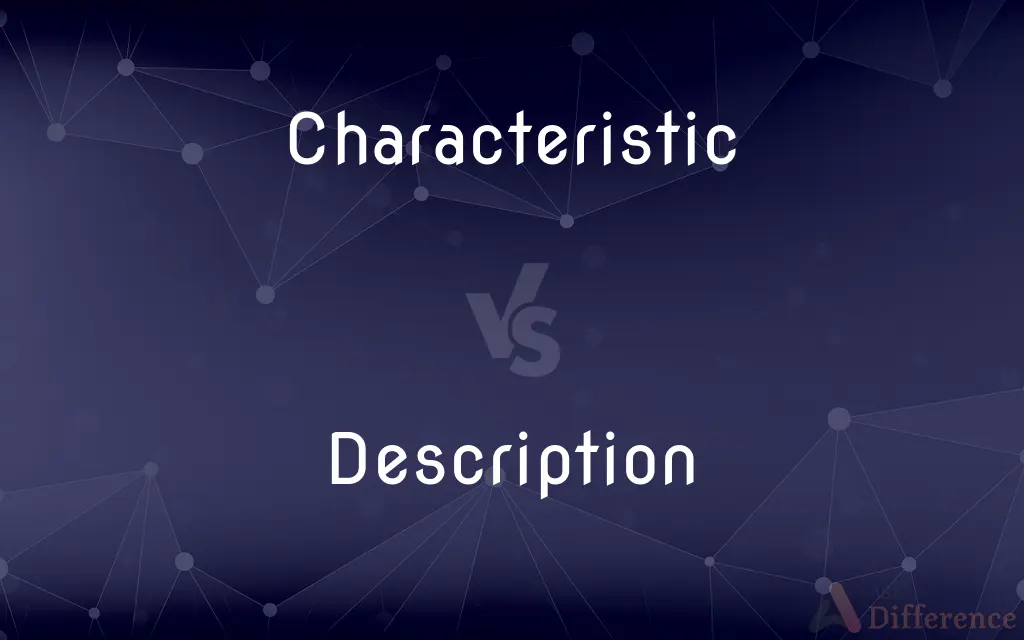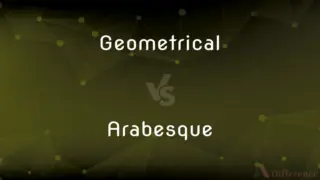Characteristic vs. Description — What's the Difference?
Edited by Tayyaba Rehman — By Urooj Arif — Updated on March 11, 2024
A characteristic is a distinguishing trait or quality of something, while a description is a detailed account or explanation of it.

Difference Between Characteristic and Description
Table of Contents
ADVERTISEMENT
Key Differences
Characteristics often define the inherent qualities or features of an entity, focusing on what makes it unique or typical. On the other hand, descriptions provide a more comprehensive narrative or explanation of an entity, encompassing both its characteristics and other elements.
Characteristics are often used in scientific and technical contexts to categorize and differentiate entities based on specific, measurable traits. Whereas descriptions are commonly found in literary, everyday, and marketing contexts, where a broader and more nuanced understanding of the entity is desired.
Characteristics are typically concise and focused, aimed at identifying key features that set an entity apart from others. They serve as quick references that encapsulate the essence of an entity. Descriptions, on the other hand, are usually more detailed and expansive, offering a richer and more comprehensive portrayal of an entity. They can include subjective impressions, historical context, and potential uses or significance.
Comparison Chart
Purpose
Identifies distinguishing traits
Provides detailed account
Nature
Objective and specific
Subjective and comprehensive
ADVERTISEMENT
Usage Context
Scientific, technical
Literary, everyday, marketing
Detail Level
Concise, focused
Detailed, expansive
Examples
Hardness (of a diamond)
Cut, color, clarity, carat (of a diamond)
Compare with Definitions
Characteristic
A distinguishing trait or quality.
The characteristic feature of an oak tree is its strong, durable wood.
Description
A depiction that conveys an overall impression.
The traveler’s description of the city was both enchanting and accurate.
Characteristic
A specific property that identifies a group.
One characteristic of mammals is their ability to regulate body temperature.
Description
A detailed account of features and traits.
The description of the landscape included every tree and hill.
Characteristic
An inherent attribute that defines something.
A characteristic of pure metals is their high conductivity.
Description
A portrayal that captures the essence of the subject.
The artist’s description of his process revealed his passion for painting.
Characteristic
A feature that is typical of a person, place, or thing.
Openness is a characteristic trait of democratic societies.
Description
A narrative that outlines characteristics and context.
The book’s description of Victorian London was incredibly detailed.
Characteristic
A descriptive aspect that differentiates an entity.
The characteristic sound of a violin is its rich, melodious tone.
Description
An explanation that provides vivid imagery.
Her description of the sunset painted a picture in our minds.
Characteristic
Typical of a particular person, place, or thing
He began with a characteristic attack on extremism
Description
Description is the pattern of narrative development that aims to make vivid a place, object, character, or group. Description is one of four rhetorical modes (also known as modes of discourse), along with exposition, argumentation, and narration.
Characteristic
A feature or quality belonging typically to a person, place, or thing and serving to identify them
Certain defining characteristics of the school emerge from the study
Description
A spoken or written account of a person, object, or event
People who had seen him were able to give a description
Characteristic
The whole number or integral part of a logarithm, which gives the order of magnitude of the original number.
Description
A type or class of people or things
It is laughably easy to buy drugs of all descriptions
Characteristic
Being a feature that helps to distinguish a person or thing; distinctive
Heard my friend's characteristic laugh.
The stripes that are characteristic of the zebra.
Description
The act, process, or technique of describing.
Characteristic
A feature that helps to identify, tell apart, or describe recognizably; a distinguishing mark or trait.
Description
A statement or an account describing something
Published a description of the journey.
Gave a vivid description of the game.
Characteristic
(Mathematics) The integral part of a logarithm as distinguished from the mantissa
The characteristic of the logarithm 6.3214 is 6.
Description
A pictorial representation
Monet's ethereal descriptions of haystacks and water lilies.
Characteristic
(Mathematics) The least number of times the multiplicative identity in a ring needs to be added to itself to reach the additive identity, or, if the additive identity is never reached, zero. The integers have a characteristic of zero; the integers modulo 12 have a characteristic of 12.
Description
A kind or sort
Cars of every size and description.
Characteristic
Being a distinguishing feature of a person or thing.
Description
A sketch or account of anything in words; a portraiture or representation in language; an enumeration of the essential qualities of a thing or species.
Give a verbal description of the events
A realistic description
Characteristic
A distinguishing feature of a person or thing.
Description
The act of describing; a delineation by marks or signs.
Characteristic
(mathematics) The integer part of a logarithm.
Description
A set of characteristics by which someone or something can be recognized.
The zoo had no lions, tigers, or cats of any description.
Characteristic
(nautical) The distinguishing features of a navigational light on a lighthouse etc by which it can be identified (colour, pattern of flashes etc.).
Description
(taxonomy) A scientific documentation of a taxon for the purpose of introducing it to science.
The type description of the fungus was written by a botanist.
Characteristic
For a given field or ring, a natural number that is either the smallest positive number n such that n instances of the multiplicative identity (1) summed together yield the additive identity (0) or, if no such number exists, the number 0.
The characteristic of a field, if non-zero, must be a prime number.
Description
(linguistics) The act or practice of recording and describing actual language usage in a given speech community, as opposed to prescription, i.e. laying down norms of language usage.
Characteristic
Pertaining to, or serving to constitute, the character; showing the character, or distinctive qualities or traits, of a person or thing; peculiar; distinctive.
Characteristic clearness of temper.
Description
(linguistics) A descriptive linguistic survey.
Characteristic
A distinguishing trait, quality, or property; an element of character; that which characterized.
The characteristics of a true critic.
Description
The act of describing; a delineation by marks or signs.
Characteristic
The integral part (whether positive or negative) of a logarithm.
Description
A sketch or account of anything in words; a portraiture or representation in language; an enumeration of the essential qualities of a thing or species.
Milton has descriptions of morning.
Characteristic
A prominent aspect of something;
The map showed roads and other features
Generosity is one of his best characteristics
Description
A class to which a certain representation is applicable; kind; sort.
A difference . . . between them and another description of public creditors.
The plates were all of the meanest description.
Characteristic
A distinguishing quality
Description
A statement that represents something in words
Characteristic
The integer part (positive or negative) of the representation of a logarithm; in the expression log 643 = 2.808 the characteristic is 2
Description
The act of describing something
Characteristic
Any measurable property of a device measured under closely specified conditions
Description
Sort or variety;
Every description of book was there
Characteristic
Typical or distinctive;
Heard my friend's characteristic laugh
Red and gold are the characteristic colors of autumn
Stripes characteristic of the zebra
Common Curiosities
How do characteristics differ from descriptions?
Characteristics focus on identifying distinguishing traits, whereas descriptions provide a more detailed and comprehensive account of something.
Can a description include characteristics?
Yes, a description can include characteristics as part of a more detailed account of something.
What is a description?
A description is a detailed account or explanation of something, providing a comprehensive portrayal of its features and aspects.
Are characteristics always objective?
Characteristics are generally objective, focusing on inherent and measurable traits, but the perception of what is characteristic can vary.
What is a characteristic?
A characteristic is a distinguishing trait or quality that defines or identifies something.
What role do descriptions play?
Descriptions play a crucial role in providing a richer, more nuanced understanding of something, often evoking imagery and emotion.
Why are characteristics important?
Characteristics are important because they help in identifying, categorizing, and differentiating entities based on their inherent traits.
How detailed should a description be?
The level of detail in a description can vary depending on the purpose and the audience's needs.
Can characteristics be used in descriptions?
Absolutely, characteristics are often used within descriptions to specify distinguishing traits.
Can a characteristic be a disadvantage?
Yes, in certain contexts, what is characteristic of an entity can be seen as a disadvantage.
Do descriptions always include physical traits?
Descriptions can include physical traits but also encompass behaviors, functions, and historical context.
How do characteristics aid in classification?
Characteristics are crucial for classification, allowing entities to be grouped based on shared traits, facilitating study and understanding.
Is a description more subjective than a characteristic?
Yes, descriptions tend to be more subjective, incorporating the observer's perspective and a broader range of information.
Can the same entity have varying descriptions?
Yes, the description of an entity can vary widely depending on the observer's perspective and the context of the description.
Are characteristics fixed or can they change?
Some characteristics are fixed, especially for inanimate objects, while others can change, particularly for living entities.
Share Your Discovery

Previous Comparison
Success vs. Succeed
Next Comparison
Geometrical vs. ArabesqueAuthor Spotlight
Written by
Urooj ArifUrooj is a skilled content writer at Ask Difference, known for her exceptional ability to simplify complex topics into engaging and informative content. With a passion for research and a flair for clear, concise writing, she consistently delivers articles that resonate with our diverse audience.
Edited by
Tayyaba RehmanTayyaba Rehman is a distinguished writer, currently serving as a primary contributor to askdifference.com. As a researcher in semantics and etymology, Tayyaba's passion for the complexity of languages and their distinctions has found a perfect home on the platform. Tayyaba delves into the intricacies of language, distinguishing between commonly confused words and phrases, thereby providing clarity for readers worldwide.














































